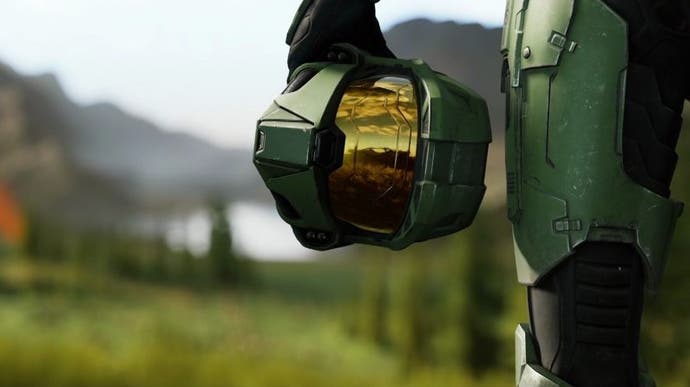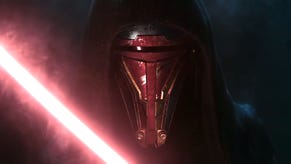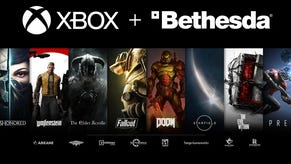Microsoft impresses with its tenacity and honesty at E3
Xbox refuses to play next-gen poker.
It was a great show, moving at a brisk clip, unburdened with cringeworthy banter, peppered with noteworthy announcements and premieres, and positively stuffed with games: 50 of the things, a lot of them looking rather good. Just as significantly, it felt addressed to Xbox gamers directly, rather than pundits, analysts and stakeholders.
But perhaps more importantly, Microsoft's E3 2018 media briefing was straight-talking - almost shockingly so for an E3 presser. It didn't pretend that Xbox doesn't have a weakness in exclusive games, and it had a long-term solution to propose. It talked about the future and it addressed the elephant in the room - the distant but quite clearly audible rumblings of an approaching new console generation - with candour and confidence, and without seeking to pull the wool of the eyes of the console-buying audience, or to use the information, or lack of it, as a strategic chip in the battle with its rival, PlayStation.

2013 seems like a long time ago. This was a presentation by a player untroubled by hubris, humbled by past mistakes, but determined to stay in the game and willing to show enough of its hand to convince us of its serious intent. Job done.
We've all been worrying about the state of Microsoft Game Studios' first-party publishing for a while, and it's true that yesterday only landed a handful of true exclusives on the table. Halo Infinite was a cool announcement but a transparently vague and distant prospect; Gears 5 seemed a bit too self-involved to turn this flagging series around; Crackdown 3 seems diminished with every showing; Forza Horizon 4 was hardly a surprise, though it did look astonishingly good. What really surprised was that Microsoft had enough self-knowledge to know it wasn't ready to stick the landing with any of these yet, and acquired the spectacular Cyperpunk 2077 trailer for the proverbial one last thing, surely knowing that it would face a few barbs for closing on a multiplatform game in the process. That's some impressive corporate realism.
And of course, for industry-watchers, the true megaton came halfway through, with the announcement of dramatic expansion of Xbox's first-party studio lineup, including Playground Games, Ninja Theory, and a new outfit headed by a Tomb Raider alumnus. These five new wholly-owned studios represent some serious talent that will be dedicated solely to making Xbox games in the future, and should, if well managed, make a dramatic improvement to that shortage of exclusives in a few years' time.

In the meantime, there was a conference to fill, and Phil Spencer's team hadn't stopped at Cyberpunk. There's always a tussle between Xbox and PlayStation for who can soak up the most reflected glory from the big third-party names, but this year Xbox swerved the juggernauts like Call of Duty and Assassin's Creed (with the arguable exception of PlayerUnknown's Battlegrounds) and instead played a smarter, cooler game. By showcasing fan-favourites like Dying Light 2 and the dreadfully titled Sekiro: Shadows Die Twice (from traditional PlayStation ally From Software), as well as CD Projekt's opus, Microsoft was consciously addressing the most passionate of gamers rather than the biggest of demographics. A move born of necessity, perhaps, but still a meaningful choice and much-needed evidence of a canny eye for what players really care about.
The most remarkable bit of gamers-first thinking in the show, however, was when Phil Spencer casually revealed that Xbox hardware team was already "deep into architecting the next Xbox consoles." (An interesting plural; given his adjacent mention of streaming technology, perhaps one of them will be a low-cost streaming box?) Well, of course they are. But it is not form to say so until you are ready to reveal and close to release, for fear of encouraging buyers to wait and undermining the sales of your current generation machines.
There are a few ways to read this. It could be a way to goad Sony into admitting the existence of PlayStation 5, although it's not clear what strategic purpose this would serve, and it's unlikely to work. It could be a simple gesture of trust in Xbox fans, which is how Spencer sought to characterise it when asked by Wes: "When people buy an Xbox, they buy into an ecosystem and they become an Xbox fan. Many of the Xbox fans we have today started on the original Xbox, were with us on 360 and they're with us now on Xbox One. I trust their commitment to our devices and our services as we go through this journey with them. So, I'm going to be open with them." That's admirable, and quite likely true, though perhaps not the whole story.
I think it's partly because Microsoft no longer thinks of Xbox as one machine, and hasn't for a while: it's a family of products and services, where your game licences work across multiple console variants and PC (and, in the future, streaming), and which is also tied together by alternative offerings like Xbox Game Pass. In this fluid context, a new, more powerful console isn't such a big existential deal.
But there's a simpler reason: we needed to hear it. Xbox has been bloodied in this round of the console war, no doubt, and Spencer has so far only been able to raise it halfway back off the mat where his predecessors left it. We needed to know that the corporate behemoth of Microsoft wouldn't get distracted, disinterested or dilute its vision for, as Spencer put it, "playing great games on a console on their television". Not an unreasonable suspicion - we've been there before, and recently. So it was genuinely great to hear. The games industry would be much poorer without everything Xbox has done for it in the last 15-plus years, and now we can feel confident it's in it for the long haul.








.jpg?width=291&height=164&fit=crop&quality=80&format=jpg&auto=webp)
